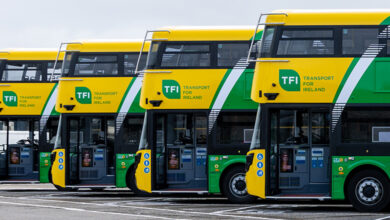RSA enforcement of commercial and passenger transport sector
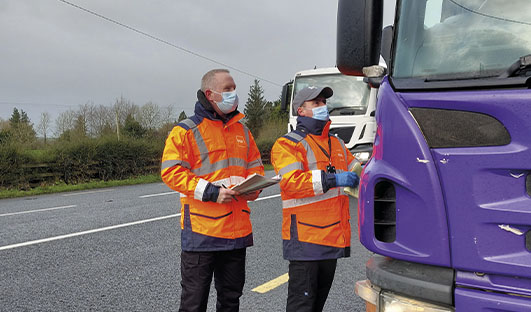
The enforcement team in the Road Safety Authority (RSA) has responsibility for enforcing and promoting compliance with commercial vehicle, driver, and operator specific road transport laws.
These laws relate to:
• driving and resting time, and tachograph regulations;
• operator licensing including cabotage;
• driver Certificate of Professional Competence (Driver CPC); and
• commercial vehicle roadworthiness.
They work in partnership with An Garda Síochána as their key enforcement partner to maximise compliance which includes putting in place annual commercial vehicle enforcement plans to ensure at a minimum Ireland meets its obligations derived from European law in respect of minimum inspection thresholds as set out in actions 152 and 154 of the Road Safety Strategy (RSS) Phase 1 Action Plan.
They also partner with industry and vehicle operators via a commercial vehicle operator advisory panel to review and address enforcement and compliance issues as set out in action 181 of the RSS Phase 1 Action Plan.
This partnership approach also includes engagement with the Department of Transport, particularly in relation to developing the new Transport Strategy which is due to be launched later this year, the European Commission, and other enforcement agencies in the State and in other jurisdictions. In addition, RSA engages with national and European agencies concerning legal and policy developments in respect of road transport matters coming within the scope of the RSA’s remit.
The RSA Enforcement team comprises transport officers and vehicle inspectors. Transport officers enforce the driving and resting time rules, and regulations dealing with operator licensing, cabotage (national haulage for hire and reward by out of state operators) and driver Certificate of Professional Competency (CPC). Vehicle inspectors inspect vehicles for adherence to minimum roadworthiness standards.
Both transport officers and vehicle inspectors carry out their functions via mix of roadside and premises inspections.
Roadside inspections are carried out in partnership with An Garda Síochána who stop vehicles for inspection on their behalf. Checkpoint locations are chosen having regard to commercial vehicle traffic volumes, proximity to transport hubs, seasonal factors as well as health and safety considerations.
RSA officers use a risk rating tool to help decide which vehicles should be inspected, which minimises disruption to compliant operators. This tool takes account of the operator’s compliance history with the RSA over the previous three years based on the results of any roadside/premises encounters, results of CVRT tests, prosecution history (where appliable) and the obligation to submit an annual self-declaration to the RSA. Operators are assessed separately for roadworthiness and tachograph and licensing compliance with a red/amber/green rating assigned to each.
Inspections take place anytime including outside core business hours and weekends. In 2021, for example, the RSA team participated in approximately 1,700 checkpoints in collaboration with An Garda Síochána countrywide, 20 per cent of which took place outside core business hours.
When carrying out premises inspections, RSA officers do not rely on An Garda Síochána. Operators can randomly be selected for inspection, or targeted when investigating/following on complaints received, or in following up on a roadside encounter.
Where non-compliance is detected, RSA officers have a range of options available to them to secure compliance. They can be applied both at the roadside or when on private property.
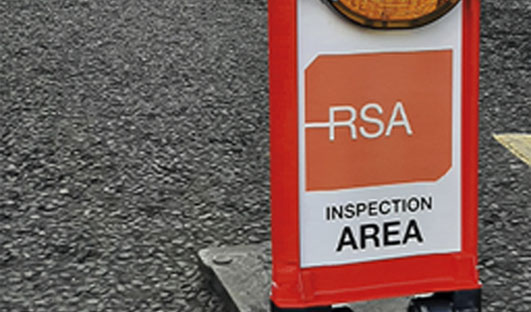
They include offering advice and education, to enforcement action which could involve issuing direction notices, prohibitions, giving oral/written warnings, directing vehicles to authorised tachograph workshops/CVRT centres for repair, including undertaking follow-up premises inspections and/or as a last resort initiating court prosecutions.
Where required, RSA transport officers initiate their own prosecutions for breaches of the drivers’ hours, tachograph, operator licensing or driver CPC Regulations, whereas RSA vehicle inspectors act in an advisory capacity to An Garda Síochána in respect of roadworthiness matters found during roadside checks. Prosecutions for roadworthiness related offences arising from roadside encounters are initiated by An Garda Síochána.
In terms of compliance, rates are relatively stable year on year. During the period from 2019 to 2021, the RSA Transport Officer team recorded a 65 per cent compliance rate at the roadside in respect of the inspection they carried out. The main infringements detected include not taking adequate breaks, drivers not using their driver’s card correctly or attempting to use somebody else’s card, and exceeding daily driving time limits.
During this same period the RSA vehicle inspector team recorded a 50 per cent roadworthiness compliance rate which quates to one in every two vehicles inspected having some form of a defect present. The main defects encountered include damaged or excessively worn tyres, followed by lighting, steering, and braking related defects.
With minor defects excluded, roadworthiness compliance improves to approximately only one in every three vehicles inspected having a defects or defects present, and whilst minor defects may not have a significant impact on the safety of the vehicle, they should be spotted if drivers are carrying out effective daily walk around checks before setting out on their journeys. Theses checks are essential in preventing potentially dangerous vehicles from causing serious or possibly fatal collisions on our roads.
Road Safety Strategy 2021-2030
Ireland’s fifth government Road Safety Strategy 2021-2030 aims to reduce the number of deaths and serious injuries on Irish roads by 50 per cent over the next 10 years. This means reducing deaths on Ireland’s roads annually from 144 to 72 or lower and reducing serious injuries from 1,259 to 630 or lower by 2030.
The strategy is the first step in achieving the 2020 Programme for Government commitment of bringing Ireland to Vision Zero, the elimination of all road deaths and serious injuries on Irish roads by the year 2050.
One of the core pillars of the strategy relates to safe work-related road use. Actions relating to this area in the 2021-2024 action plan aim to improve partnerships and enhance data sharing amongst key stakeholders not only regarding fatal and serious injury collisions, but also in relation to compliance and enforcement matters, and adherence to statutory responsibilities for safe work-related road use. They will also promote the use of safe work-related road use policies across government and key stakeholder agencies, and the use of vehicle safety standards for public procurement for public and commercial transport.
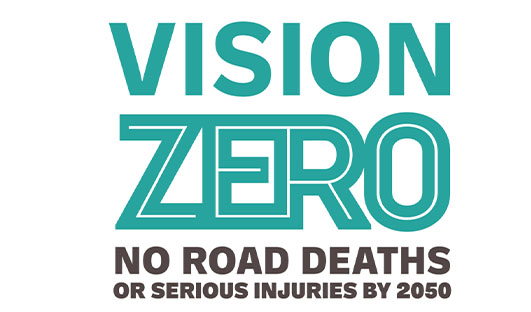
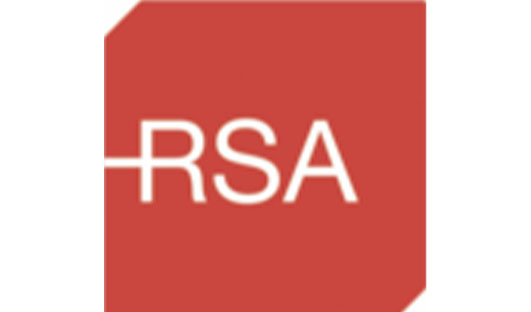
T: 096 25000
E: info@rsa.ie
W: www.rsa.ie




